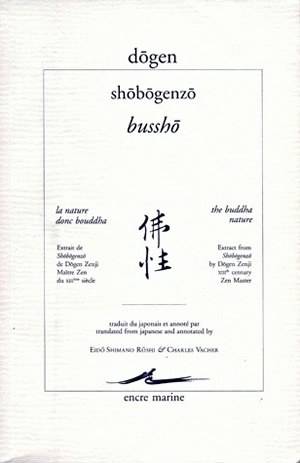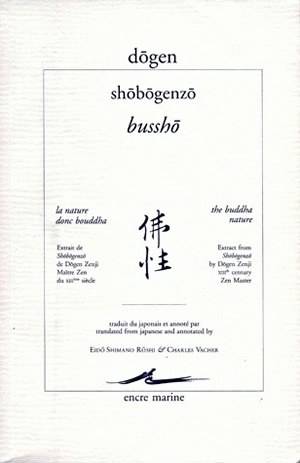
Je cadeautjes zeker op tijd in huis hebben voor de feestdagen? Kom langs in onze winkels en vind het perfecte geschenk!
- Afhalen na 1 uur in een winkel met voorraad
- Gratis thuislevering in België vanaf € 30
- Ruim aanbod met 7 miljoen producten
Je cadeautjes zeker op tijd in huis hebben voor de feestdagen? Kom langs in onze winkels en vind het perfecte geschenk!
- Afhalen na 1 uur in een winkel met voorraad
- Gratis thuislevering in België vanaf € 30
- Ruim aanbod met 7 miljoen producten
Zoeken
€ 78,45
+ 156 punten
Omschrijving
English summary: Skillfully expressing his realization of emptiness, Dogen (1200-1253) tears to pieces chapter after chapter the concept of Buddha-nature. For him, the buddha-nature is not something human beings can awaken to. It is not a nature as such. It is there-is without anything missing. The nature is not 'from' or 'of'Buddha; it is always and already buddha, even prior to heaven and earth. Emptiness is testified when the body and mind sitting in perfect concen-tration cast off attachments. Dogen's emptiness is the integral emptiness of Nagarjuna. Dogen's wisdom is the irascible wisdom of Gozanze. French description: Ce texte est la transcription par Ejo d'un discours que Dogen prononca dans le temple de Koshohorin-ji a Fukakusa, pres de Kyoto, en 1241. Le maitre zen y rejette le dogme de la nature du Bouddha, nature qui permettrait a ceux qui en sont pourvus d'atteindre l'eveil. Son vacuisme integral s'inscrit dans la droite ligne de Nagarjuna, fondateur du bouddhisme du Milieu, et de son successeur Aryadeva.
Specificaties
Betrokkenen
- Auteur(s):
- Vertaler(s):
- Uitgeverij:
Inhoud
- Aantal bladzijden:
- 544
- Taal:
- Engels, Frans
- Reeks:
Eigenschappen
- Productcode (EAN):
- 9782909422633
- Verschijningsdatum:
- 17/07/2003
- Uitvoering:
- Paperback
- Formaat:
- Trade paperback (VS)
- Afmetingen:
- 142 mm x 221 mm
- Gewicht:
- 566 g

Alleen bij Standaard Boekhandel
+ 156 punten op je klantenkaart van Standaard Boekhandel
Beoordelingen
We publiceren alleen reviews die voldoen aan de voorwaarden voor reviews. Bekijk onze voorwaarden voor reviews.









